Institutions
Thierry Chopin,
Jean-François Jamet
-
Available versions :
EN
Thierry Chopin
Jean-François Jamet
I– The institutional revival and the issue of the European Parliament's composition
1. Institutional reform and the efficiency/legitimacy debate
1.1 Planned reforms at the Council of Ministers and at the Commission
The institutional compromise reached by the Council in June 2007 has closed a political cycle open since the beginning of the 1990s that mobilised a considerable amount of political energy, and during which the European Union sought to resolve a seemingly inescapable dilemma: on the one hand welcoming new States in order to expand the project of European reconciliation initiated at the beginning of the 1950s, and on the other, faced with the pitfalls and roadblocks that such an afflux in new members can cause, redefining the way in which Member States participate in shared decision making, all while maintaining the legitimacy of these decisions. In this regard, the institutional compromise recently concluded by the 27 leaders has allowed Europe to move beyond not only the political crisis stemming from the two "no" votes of spring 2005, but also the ongoing dispute that started in the beginning of the 1990s.
The arrival of the EU of 27 has provoked, for more than 10 years, intergovernmental negotiations concerning both the Council of Minister's decision-making process and the composition of the European Commission.
For the Council of Ministers, the terms of the problem were fairly simple: if the unanimous vote is kept, the Union would have great difficulty making decisions and would be threatened by inefficiency or even paralysis; yet, would it be possible for States to forfeit discretionary powers on European decisions that have had increasingly important implications on their economy, society, and diplomacy? In an attempt to solve this problem, the Reform Treaty plans, first of all, to extend the vote by majority into new domains (border control, asylum, and immigration, for example). In addition, the extension of the majority vote used by the Council of Ministers is coupled with a new method for calculating the number of votes of each Member State. The Reform Treaty goes back to the formula used for the European constitution, founded upon a "double majority" of States and of population: the provision states that the Council of Ministers can make a decision when it has obtained the approval of at least %55 of the States of the Union (15 Member States in the Union of 27) representing at least %65 of the population. The compromise reached by the Council, partly on the insistence of Poland, plans for the new system to come into effect in 2014 or, at the latest 2017 if requested.
For the European Commission, the situation is more ambiguous: while it is supposed to embody the "European general interest", will this institution be able to continue to be composed of one representative from each Member State, at the risk of one day having 30 members and seeing its efficiency and collegial structure jeopardized? At the same time, is it conceivable that a Member State not be represented in a major common institution, especially one that has the monopoly on legislative initiatives and exercises important powers with regard to competition? Another question: is it really important to reduce the number of Commissioners to guarantee the efficiency of the college, even though it makes decisions by simple majority, or do some wish to reduce the number for other reasons, such as the desire of certain countries to gain in influence? No truly convincing answer has been found for the moment, neither in the current treaties nor even in the Reform Treaty, that, from 2014 on, would reduce the European Commission to a group of 18 Commissioners that Member States would take turns nominating. The composition of the Commission constitutes another exemplary case, as of present unresolved, of the efficiency/legitimacy dilemma at the heart of the Union.
1.2 The case of the European Parliament
The redistribution of the "decision-making weight" of the 27 Member States in the European Parliament does not, at first glance, seem to pose any major problems, or in any case less severe problems than the voting policy of the Council or the composition of the Commission. As MEPs are direct representatives of the Union's inhabitants, it seems natural to substantially increase their number at the arrival of new countries. It also seems legitimate to make the number of Euro-deputies elected by each country dependent upon the size of its population - which is why, for example, there are more German Euro-deputies than Luxembourgian or Maltese ones. Lastly, as the European Parliament makes near all of its decisions by simple majority, increasing the number of MEPs should not logically be considered a source of potential friction.
Yet, following the adhesion of Bulgaria and Romania on January 1, 2007, the European Parliament now has 785 MEPs and the Council has acted to reduce the number. The mandate of the IGC specifies that the European Parliament should have no more than 750 seats and, accordingly, certain countries will see their number of MEPs reduced. This makes negotiation difficult: it is likely that certain States will attempt to defend their vested interests, even when they go against the principle of equal representation, while others will use the same principle to support their arguments, as it is that is fairly easy for the Union's citizens to understand. As things stand today, the composition of the European Parliament is far from equal: the number of MEPs per inhabitant in Finland is twice as high as in France, for example. In a democratic system, however, citizens should have the same political rights - their vote should have the same weight. In other words, the number of inhabitants per MEP should be the same in every country, as this is an objective criterion that is difficult to contest. Paradoxically, this criterion does not necessarily seem to be a priority in diplomatic negotiations between States, where each country will not budge for fear of losing MEPs.
This is precisely what makes the seemingly simple question of the composition of the European Parliament and the distribution of its seats so complex. It seems to us that, considering the substantial growth in power that the Parliament has enjoyed, strengthening the democratic legitimacy of this institution - the only one whose members are elected by direct universal suffrage - constitutes an important goal for the current institutional revival if one wants to consider the democratisation of the common institutional system as one of the two significant challenges, next to increasing the efficiency of decision-making procedure, that the Union has had to face over the past ten years.
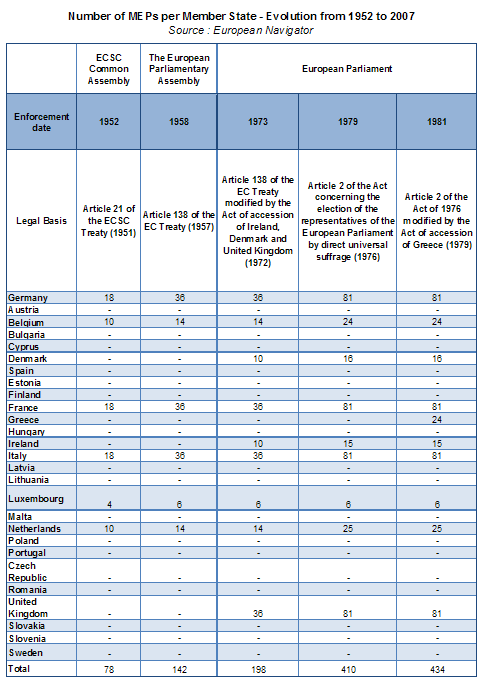
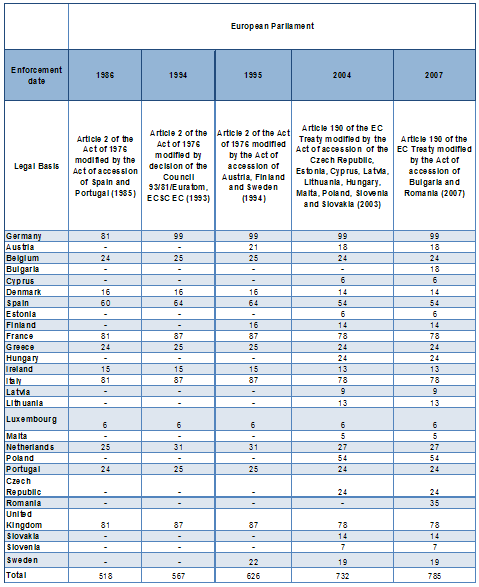
2. The composition of the European Parliament: a question of democracy
2.1 An institution elected by universal suffrage whose powers have grown through treaties
In this context, it is even more important to be conscious of the fact that the power and influence of the European Parliament on the EU decision-making process are very substantial.
The treaties of Maastricht (1992), Amsterdam (1997) and Nice (2000) have made the European Parliament a veritable legislator alongside the Council of Ministers; these treaties have led to a considerable increase in the number of domains where joint decision-making applies (from 23 to 35 domains), concerning topics such as the freedom of movement of workers, the interior market, the environment, consumer protection etc.
In budgetary matters, the European Parliament exercises a growing influence on Union spending because it has possessed, since the mid 1970s, the right to amend expenses said to be "non-obligatory", which represent close to %50 of the total budget (more than 100 billion Euros a year - less than half of the French budget, but 5 times more than that of the Irish). In addition, the European Parliament evaluates the efficiency of shared funds management and decides each year to allot or refuse the annual "discharge" (a sort of quietus) in the budget as set by the European Commission [1].
The European Parliament possesses an increasingly powerful grip on other European Union institutions, particularly the Commission. This control is both administrative (control of administrative, budgetary, and financial management) and political (control over the orientation and priorities of the European Union). At the administrative level, the European Parliament is a receptive forum for citizens able to comprehend the system (right to petition and mediator). Furthermore, the Parliament has the right to name committees of inquiry.
Politically speaking, the Parliament has some leverage over the European Commission, since it not only has the right to invest people with its offices (it ratifies nominations for President of the Commission, interviews those nominated to the Commission, and invests the Commission by vote of confidence [2]), but also can reject it.
Finally, when the European elections occur in June 2009, the juridical context of the European Union will have changed, as the Reform Treaty includes a certain number of clauses that expand the European Parliament's prerogative. For example, it is probable that legislative capacities of the Parliament will increase. The Reform Treaty, whose parliamentary ratification will no doubt take place in 2008, also provides for a significant expansion of the areas controlled by joint decision-making (in both Parliament and the Council). The enactment of the treaty will definitively mark the advent of a powerful European Parliament.
2.2 Working towards equal representation in the European Parliament: democratic legitimacy at stake
In the context of the institutional assertion of the European Parliament, the question of composition represents a new opportunity to strengthen the democratic legitimacy of the only Union institution elected by universal suffrage. If the question of efficiency is not quite as thorny as it is for other institutions as the European Parliament makes nearly all of its decisions by simple majority, the issue of legitimacy is still valid and can be approached by looking at the Parliament's composition.
It is astonishing that the criterion of democratic equity does not appear as such in the mandate of the Intergovernmental Conference. The European Council held from the 21-23rd of June 2007 put measures from article I-20 of the constitutional treaty in the mandate given to the CIG for choosing the composition of the European Parliament: the total number of MEPs must not be higher than 750; the ceiling for each individual Member State is set at 96; a floor of 6 MEPs per Member State is set; the representation of citizens must be degressively proportional, i.e. the number of MEPs per inhabitant decreases as a Member State's population increases. Adhering to these rules requires infringement upon the principle of equitable democratic representation in the European Parliament (mainly by overrepresentation of smaller States and underrepresentation of larger ones); the rules reveal the ambivalence of the legitimacy that the European Parliament stands upon. The Parliament not only has to consider the demographic weight of each Member State, but also the smaller states' desire to be represented.
This is the situation surrounding the troublesome task of finding an equitable solution for dividing the seats of the European Parliament. Our propositions aim to fulfil the various contingencies required for a proper distribution: the mandate of the Intergovernmental Conference, equitable democratic representation of all the Union's citizens and the acceptance of diplomatic constraints that stem from states' vested interests.
II– What policy for dividing seats ? An evaluation of possible options and conclusions
1. Formalising objectives and evaluation criteria
There are multiple criteria that the new distribution of MEP seats in the European Parliament must satisfy. It is necessary to distinguish the nature of each in order to prioritise them.
1.1 Respecting the IGC mandate
The mandate given to the IGC during the European Council of June 21-23, 2007 is clear and was agreed upon by all of the Member States. Its objective is to guarantee that the least populated Member States are sufficiently represented and to minimise differences in representation between States. In any case, the terms of this mandate must be respected. Briefly, they are:
• The total number of MEPs is limited to 750. • A maximum of 96 MEPs per Member State. • A minimum of 6 MEPs per Member State. • Citizens' representation must be degressively proportional, i.e. the number of MEPs per inhabitant decreases as a Member State's population increases.Respect for these criteria is, in practice, very easy to control.
1.2 Adhering to the principle of democracy
The mandate of the IGC forces the overrepresentation of the least populated Member States and the underrepresentation of the most populated states in order to limit the gap in representation between "large" and "small" countries. Nevertheless, once these criteria are taken into account it is imperative that the redistribution of seats be as democratic as possible. In other words, the number of inhabitants per MEP must vary the least amount possible from one Member State to another. This is the criterion of equity of representation.
Evaluating respect for this criterion may seem difficult. There exists, however, a simple and proven statistical method which is presented below.
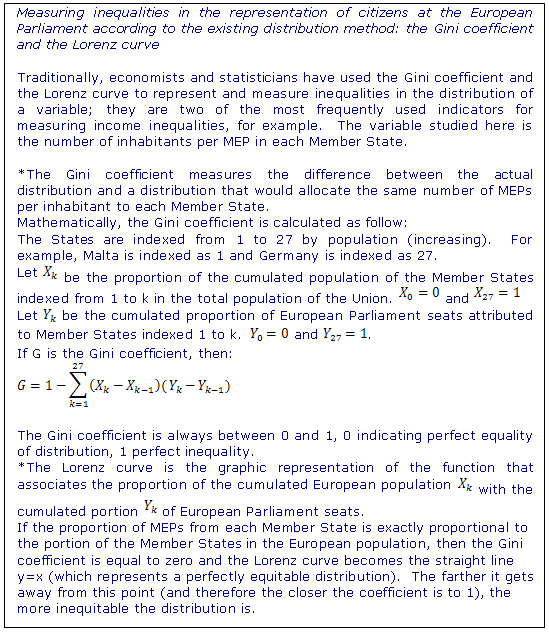
Measuring inequalities in the representation of citizens at the European Parliament according to the existing distribution method: the Gini coefficient and the Lorenz curve
Traditionally, economists and statisticians have used the Gini coefficient and the Lorenz curve to represent and measure inequalities in the distribution of a variable; they are two of the most frequently used indicators for measuring income inequalities, for example. The variable studied here is the number of inhabitants per MEP in each Member State.
*The Gini coefficient measures the difference between the actual distribution and a distribution that would allocate the same number of MEPs per inhabitant to each Member State.
Mathematically, the Gini coefficient is calculated as follow:
The States are indexed from 1 to 27 by population (increasing). For example, Malta is indexed as 1 and Germany is indexed as 27.
Let be the proportion of the cumulated population of the Member States indexed from 1 to k in the total population of the Union. and
Let QUOTE be the cumulated proportion of European Parliament seats attributed to Member States indexed 1 to k. QUOTE and QUOTE .
If G is the Gini coefficient, then:
The Gini coefficient is always between 0 and 1, 0 indicating perfect equality of distribution, 1 perfect inequality.
*The Lorenz curve is the graphic representation of the function that associates the proportion of the cumulated European population with the cumulated portion of European Parliament seats.
If the proportion of MEPs from each Member State is exactly proportional to the portion of the Member States in the European population, then the Gini coefficient is equal to zero and the Lorenz curve becomes the straight line y=x (which represents a perfectly equitable distribution). The farther it gets away from this point (and therefore the closer the coefficient is to 1), the more inequitable the distribution is.
1.3 Taking diplomatic constraints into account
Although the European Parliament represents the citizens of the Union and not of its Member States, choosing an allotment method constitutes a political issue between States and leads, as a result, to diplomatic negotiations, with the Council having the final say in deciding which proposal will be used in the Reform Treaty. Each Member State hopes to keep its MEPs and not to see its position deteriorate in relation to the previous treaty, even if doing so goes against the principle of equitable democratic representation. The IGC mandate makes a reduction in MEPS inevitable for several countries, because it will bring the total number of MEPs from 785 down to 750 and the number of German MEPs from 99 to 96.
In such a situation, how should "diplomatic constraints" be formalised? One possible way is by not taking any seats away that would conflict with the allotment agreed upon in the Treaty of Nice, modified by the adhesion treaty of Bulgaria and Romania and corrected to respect the minimum and maximum number of MEPs per Member State as set by the IGC.
1.4 Two possible hierarchizations: what priority should be accorded to the principle of democracy and to diplomatic constraints?
If one attempts to prioritize the three objectives presented above, one can see that the IGC mandate must come first because of its juridical nature; in addition, being the result of a political agreement between all Member States during the European Council of June 2007, it benefits from a certain legitimacy. The difficulty rests in knowing whether to give priority to the principle of democracy or diplomatic constraints.
From our point of view, putting diplomatic issues first certainly presents an advantage in terms of obtaining an agreement - a point which is not negligible - but does not aid in any way the construction of the democratic legitimacy that is, as European politicians know, very important for the Union's citizens. The opinion polls and debates on the constitutional treaty show they want to further democratise common institutional systems. Furthermore, the European Parliament ought to be the institution that cares most about democratic legitimacy seeing as its role is exactly that - representing the citizens of the Union.
Giving priority to diplomatic constraints would be preferential only in the short term and would be in a certain way a missed opportunity for the Union and its citizens. Conscious nevertheless of the difficulty of this question, we will present two propositions, one giving priority to the principle of democracy, the other to diplomatic constraints.
2. Evaluation of possible redistribution methods
2.1 Possible methods for redistribution
We compare the current composition of the European Parliament, the current proposed methodology for fulfilling the IGC mandate, as well as two propositions from the authors, labelled "Robert Schuman Foundation proposition no.1" and "Robert Schuman Foundation proposition no. 2", respectively. The options are as follows:
• 2007-2009: The current composition of the European Parliament, which does not respect the IGC mandate: there is a total of 785 MEPs, Malta has the fewest number of MEPs with 5 and Germany the greatest with 99. The current allotment does not respect the principle of degressive proportionality. • Modified Nice 2009/2014: The distribution that would result from the application of the provisions of the Treaty of Nice, modified by the adhesion of Bulgaria and Romania, and without taking the IGC mandate into account. • Nice + I-20 (EU 27): Proposition 2 modified to respect the 6 MEP per Member State minimum and the maximum limit of 96 MEPs. The principle of degressive proportionality is not, however, completely respected. • EU27/Spanish proposition: The proposition of the Spanish institute Elcano uses a statistical adjustment method, respecting the IGC mandate with one exception: the principle of degressive proportionality is not respected for the Czech Republic nor for Hungary. • Carnero proposition: A proposition formulated by the Spanish MEP Carlos Carnero which completely respects the IGC mandate.
Robert Schuman Foundation Proposition n°1: This proposition completely respects the IGC mandate and favors respect for democracy over diplomatic constraints. Diplomatically speaking, this solution gives the most MEPs to Poland, Spain, France, Italy, and the United Kingdom. The countries that would lose MEPs if this proposition were enacted still preserve a much higher number of MEPs per inhabitant than the Union's most populous Member States.
Robert Schuman Foundation Proposition n° 2: This proposition completely respects the IGC mandate and favors diplomatic constraints over the principle of equity in representation. It is based on solution 3, but adds 16 seats in order to respect the IGC mandate and, to a lesser extent, to render the distribution more equitable.
A complete characterisation of each of the solutions presented above can be found in Annex 1. The distribution of MEP seats for each option is given in the table below:
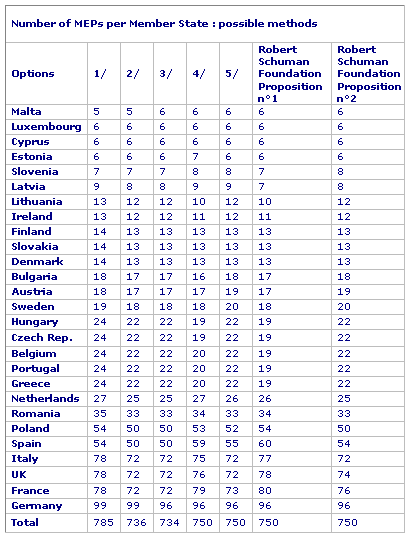
2.2. Evaluation of possible redistribution methods
To judge the possible methods, we have compared them using the criteria mentioned above. The results are presented in the following chart:
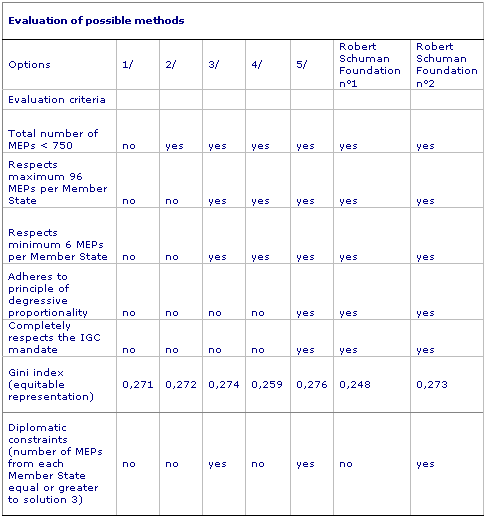
The Lorenz curves associated with the various options can be found in Annex 2. The number of inhabitants per MEP of each Member State can be found in Annex 3 for the three solutions that respect the IGC mandate.
An interesting point of comparison concerning equitable representation: the United States House of Representatives
The Gini coefficient for the equity of representation of citizens in different American states at the U.S. House of Representatives is 0.056 (versus 0.271 for the current European Parliament). In other words, the United States follow the principle of democratic equity much more closely than the European Union.
The distribution of seats at the House of Representatives adheres to the following rules:
• the total number of seats is fixed at 435 • all states have the right to at least one representative • For the rest, representation is proportional to population (currently, the base average is one Representative for 646,952 inhabitants) • the distribution is readjusted every ten years, after each federal census
3. Evaluation results: which method should be advocated?
With regards to the analysis conducted here, two choices can be made:
• If one wishes to take the diplomatic difficulties of negotiation into account, it would be best to apply "Robert Schuman Foundation proposition no. 2". • If one wishes to make democracy the first priority instead of diplomatic constraints, "Robert Schuman Foundation no. 1" is the best option. This solution enables substantial gains in the search for an equitable representation of the Union's citizens.Both solutions completely respect the IGC mandate.
To keep up with demographic changes, it would be advisable to propose a clause stipulating regular reviews, for example at every other legislature, that would also specify that each new redistribution be at least as equitable as the one before it.
An example using the entry of Croatia into the Union as a hypothesis is given below. The seats allotment would be the following if the Robert Schuman Foundation proposition no. 1 was used:
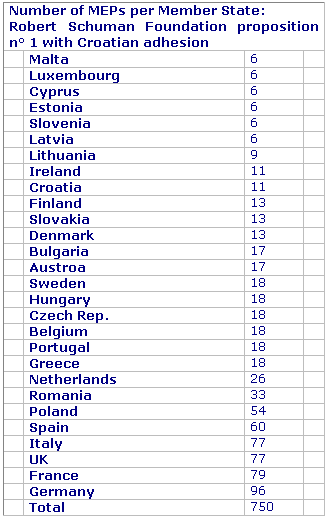
This distribution has a Gini coefficient of 0.238, which means that it would be more equitable than the previous situation. It would thus fulfil all of the criteria of the review clause as it has been defined.
When one considers the institutional reforms that the European Union began in the early 1990s, it becomes clear that the European Parliament is an important element of democratisation. The distribution of MEP seats between Member States is an opportunity to show that the respect for the principle of democracy demanded by European citizens is increasingly being recognised by EU institutions. We present here a method to evaluate the equity of representation by means of the measure that we propose and give an example of a possible improvement in equity that works within the IGC mandate. We have, nonetheless, shown that it will be difficult to succeed if the diplomatic statu quo does not change, the best solution in this case being to respect the mandate of the IGC but making no progress in terms of equity of representation of citizens at the Parliament. This would be yet another example of the difficulty that accompanies the amelioration of the efficiency of European Union institutions and the strengthening of their democratic legitimacy.
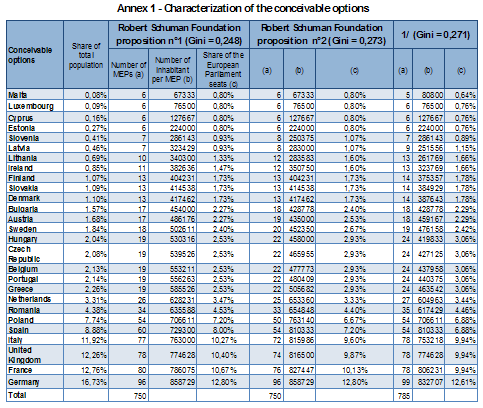
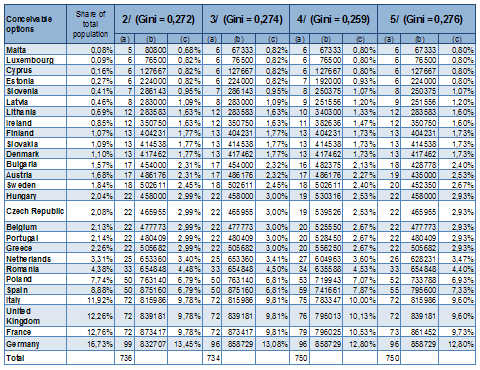

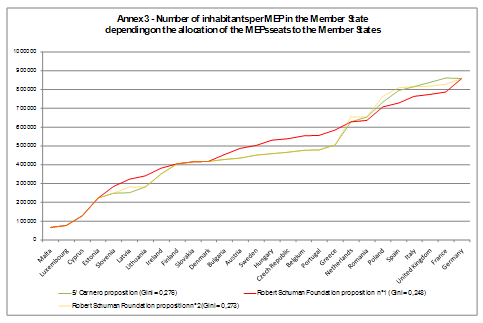
[1] In 1999, the refusal to approve the allotment of this discharge triggered the process that led the Commission presided by Jacques Santer to resign.
[2] In 2004, the " Buttiglione affair " showed yet again how the struggle for political power favors the European Parliament, the MEPs succeeding in making the President of the Commission back down and replacing the Commissioner for Justice, Freedom, and Security.
Publishing Director : Pascale Joannin
To go further
Future and outlook
Veronica Anghel
—
24 February 2026
Agriculture
Bernard Bourget
—
17 February 2026
European Identities
Patrice Cardot
—
10 February 2026
The EU and Globalisation
Olena Oliinyk
—
3 February 2026

The Letter
Schuman
European news of the week
Unique in its genre, with its 200,000 subscribers and its editions in 6 languages (French, English, German, Spanish, Polish and Ukrainian), it has brought to you, for 15 years, a summary of European news, more needed now than ever
Versions :




